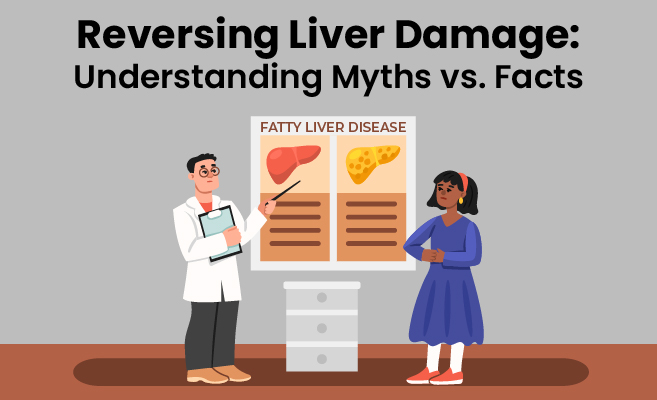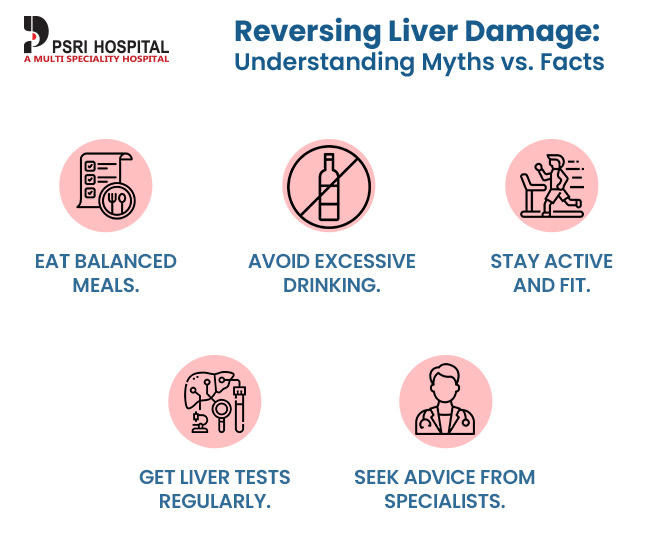Reversing Liver Damage: Understanding Myths vs. Facts

Liver damage is often seen as a daunting diagnosis, and many people believe that once the liver is damaged, it cannot be healed. However, this is not entirely true. While the liver is a vital organ with the capability to regenerate, many myths surround liver damage, leading to confusion and unnecessary worry. In this blog, we will explore reversing liver damage, dissect the myths about liver disease, and present the myths and facts about liver Health to help you understand what’s truly possible.
The Liver: A Resilient Organ:
The liver is a resilient organ capable of regenerating itself, which is why it plays a crucial role in detoxifying the body, producing important proteins, and supporting digestion. With the right treatment, lifestyle changes, and medical care, reversing liver damage can be a reality for many individuals. However, not every case of liver damage can be reversed, and it’s important to understand the extent of the damage and the underlying causes.

Common Myths About Liver Disease:
There are several misconceptions about liver damage and liver disease that can lead to confusion, misguided treatment, or unnecessary panic. Let’s take a closer look at some of the most common myths surrounding liver damage.
Myth 1: “Liver Damage Is Always Irreversible”
One of the most pervasive myths is that liver damage is irreversible. While chronic liver disease, such as cirrhosis, may lead to permanent liver damage, the liver has a remarkable ability to regenerate. If the damage is not too severe and the liver cells are not permanently scarred, with proper treatment and lifestyle changes, the liver can heal itself.
Myth 2: “You Have to Wait Until It’s Too Late for a Liver Transplant”
Many people believe that a liver transplant is the only solution when liver disease is diagnosed. While liver transplants are indeed a lifesaving procedure, they are typically reserved for individuals with end-stage liver failure. For many people with liver disease, there are other treatments that can prevent the need for a transplant, such as medication, lifestyle changes, and even alternative therapies in some cases.
Myth 3: “All Liver Diseases Are Caused by Alcohol Consumption”
While excessive alcohol consumption is a well-known risk factor for liver disease, it is not the only cause. Many liver diseases, such as hepatitis and non-alcoholic fatty liver disease (NAFLD), are caused by factors like viral infections, obesity, and genetic predispositions. The liver can be damaged by various factors, not just alcohol.
Myth 4: “Liver Disease Symptoms Always Appear Early”
One of the most dangerous myths is that liver disease symptoms are always noticeable in the early stages. In reality, liver disease can progress silently, with no obvious symptoms until the condition has advanced significantly. Regular check-ups and liver function tests are essential for early detection and management.
Myth 5: “Herbal Supplements Can Completely Cure Liver Disease”
There is a misconception that herbal supplements can cure liver disease. While certain herbs may have some positive effects on liver function, there is no magic cure for liver damage. Treatment for liver disease should always be guided by a medical professional, such as the best liver doctor in Delhi, who can provide a tailored plan based on the individual’s specific condition.
Myths and Facts About Liver Health:
Now that we’ve discussed some of the common myths about liver disease, let’s look at some important facts that can help you better understand liver health.
Fact 1: The Liver Can Regenerate Itself:
The liver has a unique ability to regenerate its cells, making it one of the few organs in the body with such regenerative capabilities. If a portion of the liver is damaged or removed, the remaining healthy tissue can often regenerate to restore normal function. However, this regeneration process depends on the extent of the damage, and if the liver is extensively scarred, regeneration may be limited.
Fact 2: Lifestyle Changes Can Improve Liver Health:
One of the most effective ways to reverse liver damage is through lifestyle changes. A balanced diet, regular exercise, and maintaining a healthy weight can significantly reduce the strain on the liver and improve its ability to function properly. For individuals with non-alcoholic fatty liver disease (NAFLD), these lifestyle modifications are often the first line of treatment.
Fact 3: Early Detection Leads to Better Outcomes:
As mentioned earlier, liver disease often progresses without noticeable symptoms. Regular check-ups and blood tests can help detect liver disease early before it reaches a critical stage. If you’re concerned about your liver health, consulting the best liver specialist in Delhi NCR or seeking advice from a liver expert can help you take proactive steps to protect your liver.
Fact 4: Hepatitis Can Be Prevented and Managed:
Hepatitis, a viral infection that causes inflammation in the liver, can lead to serious complications if left untreated. However, it can be prevented through vaccination in some cases, and antiviral medications can help manage the disease and reduce the risk of long-term liver damage. The best liver specialist in India can guide you on vaccination and treatment options based on the type of hepatitis you may be dealing with.
Fact 5: Liver Transplantation is not a good option:
In severe cases where the liver is beyond repair, a liver transplant may be necessary. While a liver transplant is a major surgery, it has saved countless lives worldwide. India, in particular, is home to some of the top hospitals offering liver transplants, such as the best hospital for liver transplant in Delhi, which is known for its advanced medical facilities and expert care.
Chronic Liver Failure: Symptoms, Causes, Treatment
Chronic liver failure is a condition where the liver loses its ability to function over time, usually due to long-term liver diseases like cirrhosis. Some of the common symptoms include jaundice, fatigue, swelling in the abdomen, and confusion. If you experience any of these symptoms, it’s important to seek medical advice from a liver specialist to prevent further damage.
The causes of chronic liver failure include viral hepatitis, alcohol-related liver disease, and autoimmune disorders. Treatment options vary depending on the underlying cause and the extent of the damage. In some cases, liver transplantation may be required to save the patient’s life.
How to Prevent Further Liver Damage?
Preventing further liver damage requires taking active steps to protect your liver. Here are some key strategies to keep in mind:
- Maintain a Healthy Weight: Obesity is a major risk factor for liver disease, particularly NAFLD. Maintaining a healthy weight through a balanced diet and exercise can prevent further damage.
- Avoid Excessive Alcohol Consumption: Limiting alcohol intake can prevent alcohol-related liver disease and allow the liver to heal.
- Get Vaccinated: Hepatitis vaccinations can help protect the liver from viral infections.
- Follow Medical Advice: If you’ve been diagnosed with liver disease, working closely with a medical professional is essential. The best liver specialist in India can provide personalized treatment plans and guidance.
Conclusion!
The myths surrounding liver damage can create confusion and prevent people from seeking the necessary treatment. However, the truth is that reversing liver damage is possible in many cases with proper care and lifestyle changes. Early detection, appropriate treatment, and expert guidance from the best liver doctor in Delhi can significantly improve outcomes for individuals with liver disease.
If you’re concerned about your liver health or want to know more about liver transplant cost in India, don’t wait. Reach out to the best liver specialist in Delhi today for a consultation and take the first step towards a healthier liver. At PSRI Hospital, we offer expert care for a wide range of liver conditions, helping you navigate the path to recovery with confidence. Visit our website to learn more about our liver services and to schedule an appointment.
Frequently Asked Questions:
Can liver damage be reversed?
Ans. Yes, in many cases, liver damage can be reversed with early intervention, treatment, and lifestyle changes.
What are the signs of liver damage?
Ans. Symptoms include jaundice, fatigue, abdominal pain, and swelling.
How long does it take for the liver to heal?
Ans. Healing time varies depending on the severity of damage, but with proper care, the liver can regenerate within weeks to months.
What are the treatment options for liver damage?
Ans. Treatment includes medication, lifestyle changes, and in severe cases, liver transplantation.
Can alcohol cause irreversible liver damage?
Ans. Excessive alcohol can lead to irreversible liver damage, but early intervention can prevent further harm.
How do I know if I need a liver transplant?
Ans. Liver transplant is considered when liver function is severely compromised, and other treatments are ineffective.

 Book An Appointment
Book An Appointment Virtual Consultation
Virtual Consultation





